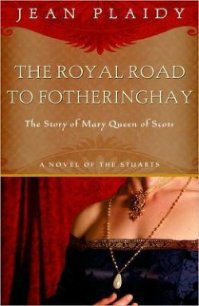Queen of This Realm - Plaidy Jean (читать бесплатно книги без сокращений .txt) 📗
There are vague memories in my mind, prompted no doubt by accounts I heard from members of my household; but I see myself at the age of two being taken up by my father, held high while he threw me up and caught me in his strong arms and held me firmly against his jewel-encrusted surcoat. I had felt no qualms that he would drop me. I never knew anyone exude power as my father did. As a child I believed him to be different from all others, a being apart. Of course, I had always seen him as the most powerful person in the kingdom—which undoubtedly he was—and my childish mind endowed him with divine qualities. He was not only a king; he was a god. My mother and Sir Henry Rowte, my priest, chaplain and Clerk of the Closet, might instruct me in my duties to One who was above us all, but in my early days that one was my father.
I was so happy to be held in his arms and to see my beloved mother standing beside me, laughing, happy, beautiful and contented with me.
I remember my father's carrying me to a man in red robes who reverently took my hand and kissed it. My father regarded this man with great affection, and it seemed wonderful to me that he should kiss my hand. It meant something. It pleased my father. I knew by that time that he was my godfather, the great Cardinal Wolsey.
That had been when I was exactly two years old. I think the ceremony must have been in recognition of that fact. It was not only the great Cardinal who kissed my hand. I was taken to the Venetian ambassador and he was presented to me. I had been told I had to extend my hand for him to kiss, which I did in the manner which had been taught me, and I knew this caused my father's mouth to turn up at the corners with approval. Several people were presented to me afterward and I believe I remember something of this. While I was in my father's arms, I saw a man in dark robes among the assembly. I knew him for a priest. Priests, I had been told, were holy men, good men. I was drawn to them all throughout my life. I wanted to see this one more closely, so I called out, “Priest, Priest. Come here, Priest.”
There was astonishment among the company, and my father beckoned to the man to come forward. He did and stood before me. He took my hand and kissed it. I touched his dark robes and said: “Stay here, Priest.” The man smiled at me and, basking in my approval, he overcame his awe of the King and stammered out that the Princess Mary was a child of many gifts and the most bright and intelligent of her age he had ever seen.
People remember that occasion more for the manner in which I summoned the priest than that it was my second birthday and that the King was showing his love for me and that he was becoming reconciled to the fact that he might never have a legitimate son to follow him, which would make me, his daughter, his heir.
I was at that time at Ditton in Buckinghamshire. On the other side of the river was Windsor Castle and there was frequent traffic between the two places. I looked forward to those occasions when the ferryman rowed us across the river. I had my household governed by the Countess of Salisbury, who was a mother to me when my own beloved mother was not able to be with me. She deplored these absences, I knew, and had made me understand that she loved me dearly, and in spite of my reverence for my father, she was the person I loved best in the whole world.
Whenever she visited the household, she and the Countess would talk of me. My mother wanted to know everything I did and said and wore. She made me feel cherished; and the greatest sorrow of my early life was due to those occasions when we had to part.
She would say: “Soon we shall be together again and when I am not here the lady Countess will be your mother in my place.”
“There can only be one mother,” I told her gravely.
“That is so, my child,” she answered. “But you love the Countess as she loves you, and you must do everything she tells you and above all remember that she is there… for me.”
I did understand. I was wise for my years. I had, as Alice Wood, the laundress used to say, “an old head on little shoulders.”
Soon after that, when I was two years and eight months old, my first betrothal took place.
A son had been born to Franois Premier, the King of France, and my father and the Cardinal believed that it would strengthen the friendship between our two countries if a marriage was arranged for us. Although I was almost exactly two years older—the Dauphin was born on the 28th of February 1518—we were of an age. I had no notion of what this was all about. I do vaguely remember the splendid ceremony at Greenwich Palace, largely because of the clothes I had to wear. They were heavy and prickly; my gown was of cloth of gold, and my black velvet cap so encrusted with jewels that I could scarcely support its weight. My prospective bridegroom, being only eight months old, was naturally spared the ceremony and a somewhat solemn-looking Admiral Bonnivet represented him. I remember the heavy diamond ring he put on my finger.
The great Cardinal celebrated Mass. I was too uncomfortable in my unwieldy garments to be anything but pleased when it was all over.
The Countess told me that it was a very important occasion and it meant that one day I should be Queen of France. I need not be alarmed. The ceremony would not be repeated until the Dauphin was fourteen years old— by which time I should be sixteen… eons away in time. Then I should go to France to be prepared for the great honor of queenship.
My mother did not share in the general rejoicing. I learned at an early age that she did not like the French.
I was three years old when an event took place which was of the greatest importance to my mother and therefore to me, although, of course, at this stage of my life I was blissfully ignorant of it and of the storms which had begun to cast a cloud over my parents' marriage.
Later I heard all about it.
I had sensed that there had been a certain disappointment at my birth because I was not a boy, and I was aware some time before my third birthday that there was an expectancy in the Court which had seeped into my household. People whispered. I caught a word here and there. I think I must have been rather precocious. I suppose any child in my position would have been. I did not know what the undercurrents meant but I did somehow sense that they were there.
My mother was ill and I heard it murmured that this was yet another disappointment, though “it” would only have been a girl. The King was angry; the Queen was desolate. It was yet another case of hope unfulfillled.
“Well, there is time yet,” I heard it said. “And after all there is the little Princess.”
And then a boy was born—not to my mother, though. He was a very important boy, but he could not displace me. He was flawed in some way. He was—I heard the word spoken with pity and a touch of contempt—a bastard.
But there was something special about this bastard.
I learned the story later. Bessie Blount was not the King's first mistress. How my poor mother must have suffered! She, the daughter of proud Isabella and Ferdinand, to be forced to accept such a state of affairs. Men were not faithful… kings in particular… but they should veil their infidelities with discretion. I heard many tales of Bessie Blount; how she was the star of the Court, how she sang more prettily and danced more gracefully than any other; and how the King, tiring of his Spanish Queen who, in any case was more than five years his senior, was like every other man at Court fascinated by her.
There had been another woman before Bessie Blount's arrival on the scene. She was the sister of the Duke of Buckingham and was at Court with her husband. The Duke of Buckingham considered himself more royal than the Tudors. His father was descended from Thomas of Woodstock, who was a son of Edward III, and his mother had been Catherine Woodville, sister to Elizabeth, Queen of Edward IV. So he had good reasons—particularly as the Plantagenets were inclined to regard the Tudors as upstarts. My own dear Countess of Salisbury was very proud of her Plantagenet ancestry but she was wise enough not to talk of it.




